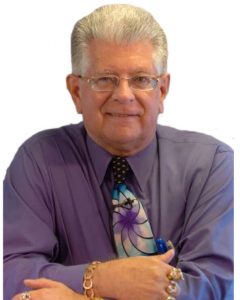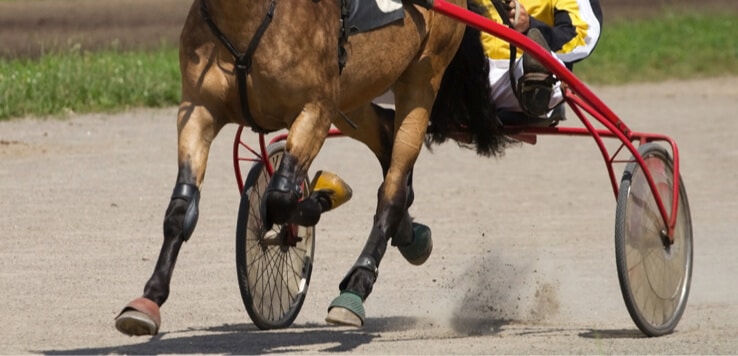Roger Huston, by his count, has called more than 188,500 horse races since 1960, including nearly every harness race at the Meadows racetrack near Pittsburgh since 1976.
His familiar voice urging bettors to get to the windows as post time nears — “Don’t get shut out!” — will no longer be heard at the Washington County track after Saturday’s race card. At age 77, Huston recently announced he was retiring from full-time announcing to take a paid staff position as ambassador for the Ohio Harness Horsemen’s Association.
He will continue announcing Delaware, Ohio’s famed Little Brown Jug and other races at county fairs in the U.S. and around the world. Huston’s withdrawal from the Meadows, however, marks the end of an era for the many patrons who can recall no excited voice but his down the stretch, letting them know if their betting slips are worth holding onto.
The much-honored announcer took some time this week to reflect on his career and the horse racing industry for Penn Bets. (The interview has been edited for brevity and clarity.)

Penn Bets: First of all, how would you even have known to keep track of how many races you’ve called over six decades?
Roger Huston: I’m a statistician. As a youngster, I would sit at home and keep the stats on the Cleveland Browns football team. Throughout my entire career I’ve been a numbers guy. For one reason or another, when I first started in harness racing, I kept track of not only the number of races but the amount of money I made. I eventually quit counting the money and just kept on counting the races.
You could have stopped long ago — what’s been the attraction to call so many races for so long?
RH: I never felt like I worked a day in my life when it comes to announcing a race. It might be time-consuming, but I loved what I did — I never called it work.
What’s so special about it?
RH: In my first year announcing in 1960 in Ohio, a gentleman wanted to talk to me after a race. He said he was blind and had been coming to the races for 10 or 15 years, and this was the first time he’d ever seen a horse race. My description, the way I delivered the race over the PA system, actually gave video to a blind person. Hearing that, that one little instance, can affect your life forever.
How would you describe your announcing style?
RH: I guess I’ve got some ham in me, some showmanship. The biggest criticism of me I’ve heard is people say I call every race like it’s the Adios or Little Brown Jug. My answer is that to the owner, trainer, and driver of horses in that particular race, that might be as close as they ever come to being in the Adios or Little Brown Jug. Even though it might be a $5,000 claiming race, for somebody that race is the No. 1 race at that time. That’s why you give it your all.
It seems challenging, keeping track of all those different horses by name every race and calling out the changes in the field rapidly as they round the track. How hard is it?
RH: You could take the greatest football or basketball announcer — bring in whoever you want — and they will fall flat on their face announcing a horse race. In their games, Ben Roethlisberger is always number 7, always the quarterback. Michael Jordan is always 23. In harness racing, the driver changes every race — he’s maybe 3 in the first race, 7 in the second race, it’s constant change. I’ve always had the uncanny ability to look through the binoculars, look down at the racing form at the same time if I need help. It all just comes natural after so many years.
You started at the Meadows 43 years ago. What’s the biggest difference today from then?
RH: In 1976 there probably wasn’t another restaurant within three miles of the racetrack, and maybe one movie theater nearby with two screens. Now there’s so much more out there as entertainment. The competition has changed over the years, and it’s taken away from the attendance at the racetracks — not just the Meadows but every racetrack in America, thoroughbred and harness both.
The revenue from Pennsylvania starting its casino industry was supposed to preserve and revive horse racing in the state. How would you say that’s worked out?
RH: It’s helped by giving the industry larger purses where people can buy horses and race horses and make a considerable amount of money. I think we have one of the best driving colonies in all of harness racing at the Meadows, where a lot of tracks have two or three standout individuals, and at the Meadows we can go about 10 deep with drivers considered top notch.
You’ve also announced thoroughbred races — what’s the biggest difference between the two types?
RH: Maybe it’s because I grew up with harness racing, but I enjoy it more. I think there’s much more skill for a driver than a jockey. I’ve seen several successful jockeys retire from riding and try to become harness drivers and fail miserably. The maneuverability is much harder in harness racing than with thoroughbreds.
Part of your duties are to set the morning line as a handicapper, with all the horses’ odds that ends up in the race program. How hard is that?
RH: I have to do it at least two days in advance of the race, which makes it difficult. You don’t know what the track conditions are going to be, which can change everything. You’re not necessarily trying to pick the winner, but anticipate who the betting public will line up with. I find that difficult, because the way different people look at the race is different.
How often have you bet yourself over the years, and how successful are you?
RH: People think because I handicap races I’m a bettor, but I doubt I’ve bet even $2,000 in 60 years. I don’t really get any enjoyment out of it. I’m not a gambler. When they write my check each week for announcing, I want my entire check — not half of it blown away on the horses.
How hard do you think it is for someone to make money regularly betting on racing?
RH: Very hard. I have no stats, but I’d say far more people are losing money than making money. I’ve known a couple big gamblers who made a good living at it, but that’s maybe five or 10 people I’ve known who have been successful in my 60-year career. I don’t generally associate with them the bettors – I’m not sitting down in the racebook. I’m up in a room by myself.
What makes race handicapping so hard?
RH: Everybody looks at a race differently, with so many things to consider. Maybe you judge past performance. I give a lot of thought to horses that make bad breaks. You have to have some memorization to a degree of past races. I look for horses that have good final quarters coming home. I put a lot of weight on post positions, like the winningest post positions at the Meadows are 5 and 4. I automatically think they have a better shot, but if the 5 and 4 haven’t been doing anything, you look elsewhere. You look at horses changing class, changing drivers. There’s just so many factors that have to be considered.
How well is Pennsylvania’s racing industry set up now for the future?
RH: It’s a day-in, day-out situation where you try to make it work. I like to explain it in terms of a roller coaster. At the Meadows, when we were the only game in town, we were at the top of the roller coaster. Then it started going down, but trended back up when we had call-a-bet wagering for people in their home. Then it was down again, and we went to full-card simulcasting and all of a sudden started going back up. It went down again, and what did they do — built off-track wagering facilities. For a while we went back up, and the attendance has been like that down and up and I figure it’ll probably continue that way for years to come, like the stock market.






